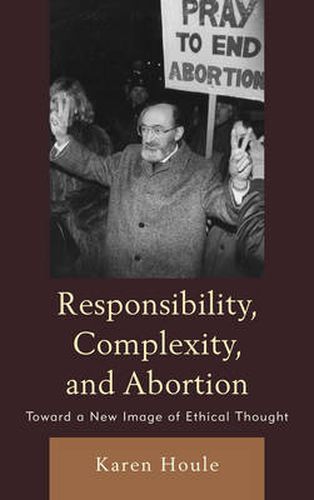Readings Newsletter
Become a Readings Member to make your shopping experience even easier.
Sign in or sign up for free!
You’re not far away from qualifying for FREE standard shipping within Australia
You’ve qualified for FREE standard shipping within Australia
The cart is loading…






Responsibility, Complexity, and Abortion: Toward a New Image of Ethical Thought draws from feminist theory, post-structuralist theory, and complexity theory to develop a new set of ethical concepts for broaching the thinking challenges that attend the experience of unwanted pregnancy. Author Karen Houle does not only argue for these concepts; she enacts a method for working with them, a method that brackets the tendency to take positions and to think that position-taking is what ethical analysis involves. This book thus provides concrete evidence of a theoretically-grounded, compassionate way that people in all walks of life, academic or otherwise, could come to a better understanding of, and more complex relationship to, difficult ethical issues. On the one hand, this is a meta-ethical book about how people can conceive and communicate moral ideas in ways that are more constructive than position-taking; on the other hand, it is also a book about abortion. It testifies from a first-person female perspective about the life-long complexity that attends fertility, sexuality and reproduction. But it does not do so in order to ratify abortion as a woman’s issue or a private matter or as feminist work. Rather, its aim is to excavate the ethical richness of the situation of unwanted pregnancy showing that it connects to everyone, affects everyone, and thus gives everyone something unique and new to think.
$9.00 standard shipping within Australia
FREE standard shipping within Australia for orders over $100.00
Express & International shipping calculated at checkout
Responsibility, Complexity, and Abortion: Toward a New Image of Ethical Thought draws from feminist theory, post-structuralist theory, and complexity theory to develop a new set of ethical concepts for broaching the thinking challenges that attend the experience of unwanted pregnancy. Author Karen Houle does not only argue for these concepts; she enacts a method for working with them, a method that brackets the tendency to take positions and to think that position-taking is what ethical analysis involves. This book thus provides concrete evidence of a theoretically-grounded, compassionate way that people in all walks of life, academic or otherwise, could come to a better understanding of, and more complex relationship to, difficult ethical issues. On the one hand, this is a meta-ethical book about how people can conceive and communicate moral ideas in ways that are more constructive than position-taking; on the other hand, it is also a book about abortion. It testifies from a first-person female perspective about the life-long complexity that attends fertility, sexuality and reproduction. But it does not do so in order to ratify abortion as a woman’s issue or a private matter or as feminist work. Rather, its aim is to excavate the ethical richness of the situation of unwanted pregnancy showing that it connects to everyone, affects everyone, and thus gives everyone something unique and new to think.